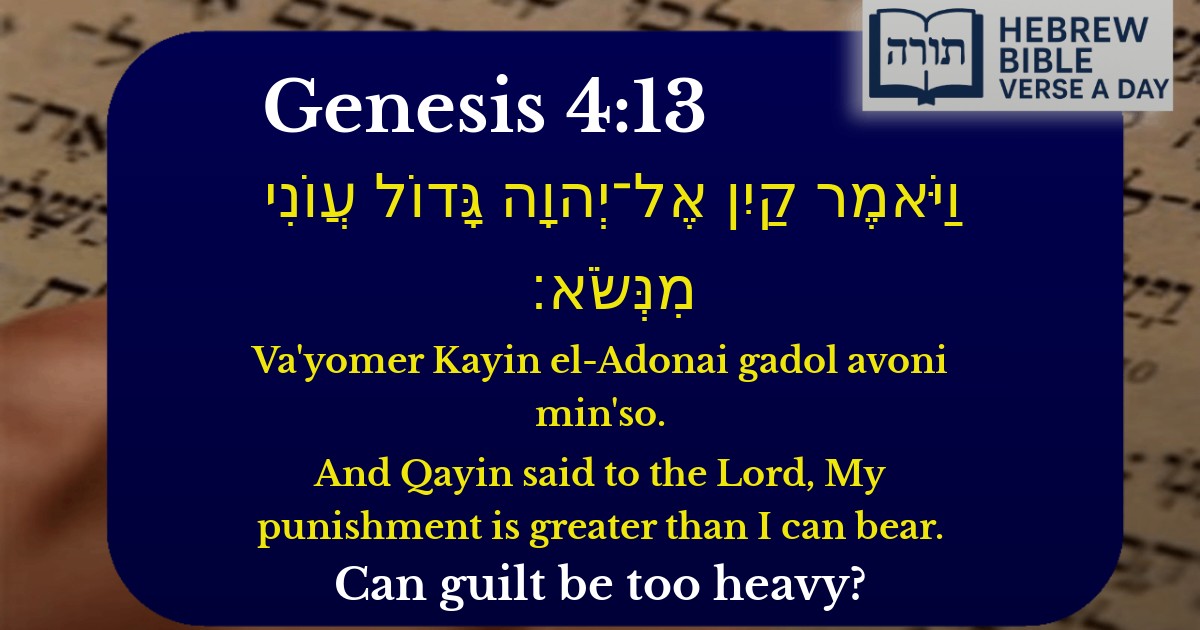Frequently Asked Questions
Q: What does Cain mean when he says 'My punishment is greater than I can bear'?
A: According to Rashi, Cain was expressing that his guilt and punishment for killing his brother Abel felt overwhelming. He wasn't just worried about earthly consequences, but also about the spiritual burden of his sin before G-d. The Midrash (Bereshit Rabbah 22:13) explains that Cain felt the weight of both this world and the World to Come.
Q: Why is Cain's statement important in the Torah?
A: This verse teaches us about repentance and accountability. The Rambam (Hilchot Teshuvah) explains that even after serious sins, one shouldn't despair of repentance. Cain's words show us how a person might feel when confronted with their wrongdoing, serving as a lesson about taking responsibility for our actions.
Q: How does Cain's reaction apply to us today?
A: The Talmud (Yoma 86b) teaches that no one should say 'I cannot repent' - even Cain was given a chance. This verse reminds us that while we may feel overwhelmed by our mistakes, we must not give up on doing teshuva (repentance). Every person has the ability to return to G-d, no matter what they've done.
Q: What can we learn from how Cain spoke to G-d in this verse?
A: The Sages note that Cain didn't remain silent before G-d - he expressed his feelings honestly. This teaches that even when we feel burdened, we should maintain an open dialogue with Hashem through prayer. As the Talmud (Berachot 10a) teaches, we should always pour out our hearts before G-d.
Q: Did Cain repent for killing Abel?
A: Jewish tradition is divided on this question. Some Midrashim (like Pirkei D'Rabbi Eliezer 21) suggest Cain did partial repentance, while others say he didn't fully repent. The verse shows he recognized his sin was serious, but the Torah doesn't state clearly whether his repentance was complete. This teaches us that recognizing our wrongs is just the first step in proper teshuva.


Cain's Admission of Guilt
The verse "וַיֹּאמֶר קַיִן אֶל־יְהוָה גָּדוֹל עֲוֺנִי מִנְּשֹׂא" (Bereshit 4:13) reflects Cain's response after Hashem confronts him for murdering his brother Hevel. Rashi explains that Cain acknowledges the severity of his sin, recognizing that his avon (iniquity) is too great to bear. However, commentators debate whether this was genuine repentance or merely an expression of despair over his punishment.
Interpretations of Cain's Statement
Theological Implications
The verse raises questions about teshuvah (repentance) and divine justice. The Talmud (Sanhedrin 37b) discusses how even a murderer like Cain was given an opportunity to repent, emphasizing that no sin is beyond forgiveness if one sincerely returns to Hashem. However, Cain's response demonstrates the complexity of true repentance—whether it stems from fear of punishment or genuine remorse.
Lessons from Cain's Words
This verse teaches that acknowledging sin is only the first step; true teshuvah requires:
Cain's incomplete repentance serves as a cautionary example, highlighting the need for sincere spiritual transformation.